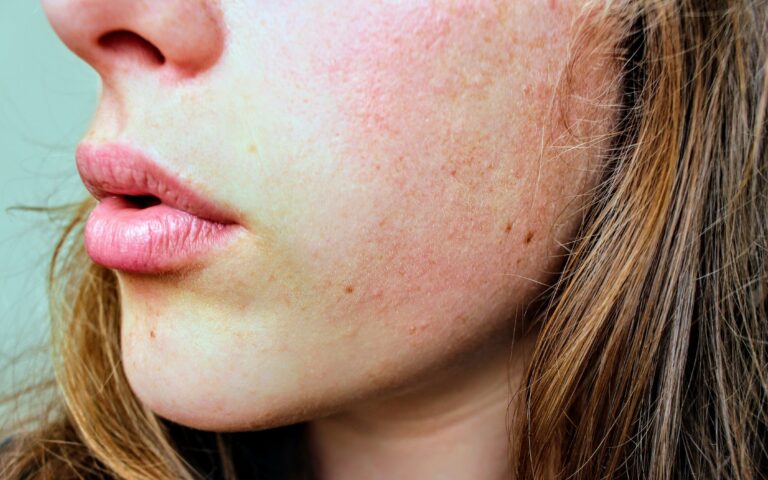DNA and Skincare: The Genetics of Psoriasis
Aira
on
April 3, 2023
DNA and Skincare: The Genetics of Psoriasis

Many skin conditions plague millions of people all over the world. Some of them are more serious than others, causing changes in lifestyle and the quality of life of the individual who has them. One of the most common skin conditions is psoriasis. Although technically, psoriasis is an autoimmune disease, its effects are most commonly seen in a person’s physical appearance.
Psoriasis has a high likelihood of being hereditary, meaning that genetics play a role in the development of this disorder. Genetic testing for psoriasis can help you determine whether you are at risk or not. LifeDNA offers full and comprehensive information about your skincare and its relationship with your genetic variation.
Psoriasis and Other Genetic Skin Traits
Psoriasis can cause inflammation, redness, and itchy scale-like scabbing on the skin, scalp, knees, elbows, hands, feet, and other parts of the body. As your body produces new skin cells, the immune cells in your blood mistake them for foreign invaders and attack these new skin cells which causes an overproduction of new skin cells beneath your skin. They force out the existing skin cells which results in scabbing and a scale-like appearance of the skin.
According to studies, genetics play an important role in determining if a person will develop psoriasis or not. While there are cases wherein a person with psoriasis has no family history of the disease, the likelihood of developing it goes up to 50 percent if one or both parents has a history of the autoimmune disorder.
Psoriasis is also more commonly seen in adults compared to eczema which is often diagnosed in children. The two can be very similar in symptoms so a dermatologist may need to run multiple tests to be sure. Excessive stress and allergens can also be contributing factors to developing psoriasis.
Other skin conditions can also be genetic. Some of them can cause extreme pain or discomfort and affect an individual’s self-esteem. Knowing more about DNA skincare can help you manage these conditions or prevent them from developing.

Acne
A common skin condition mostly seen as a dilemma for teenagers and young adults, acne may vary in severity. When the skin produces too much sebum, your follicles can clog and pimples may form. These pimples may multiply and be inflamed for a period of time. Acne can be uncomfortable but is highly treatable.
Facial Wrinkles
As the dreaded evidence of aging, wrinkles are considered an enemy of many people. They can be the result of lifestyle, sun damage, smoking, excessive alcohol, and genetics. They appear as fine lines and skin furrows, giving the skin an “old-weathered” look.
Varicose Veins
Varicose veins (VVs) commonly appear on the legs. They are swollen and twisted veins that can be a pain both medically and aesthetically. They can cause swelling of the legs and feet as well. While not usually painful, they can cause muscle cramps, swelling, and itching.
Rosacea
A chronic condition, rosacea is an inflammatory skin condition. It primarily affects areas of the face such as the cheeks, forehead, nose, and chin. It is most common and evident in fair-skinned people because they cause the skin to appear red, flushed, and sometimes a bit swollen. While not curable, rosacea is manageable with certain topical and oral medications.
Want to know more about your genetic likelihood of developing psoriasis and unlock personalized skincare suggestions to help prevent and manage this condition? Unlock LifeDNA’s DNA skincare report today.
Personalized Beauty Insights from LifeDNA’s DNA Skincare Test

Skincare is one of the most popular and valuable industries in the world today. There are thousands upon thousands of beauty and cosmetic companies that produce millions of skincare products. If you suspect you are prone to certain skin conditions due to your genetic variation, try a skin DNA test.
A skincare routine will highly depend on your skin’s suitability. Genetics will also play an important role in managing certain skin conditions and even influence their development in the first place. Want to get reveal your most beautiful complexion based on personalized skincare insights? Try LifeDNA today.
*Understanding your genetics can offer valuable insights into your well-being, but it is not deterministic. Your traits can be influenced by the complex interplay involving nature, lifestyle, family history, and others.
Our reports have not been evaluated by the Food and Drug Administration. The contents on our website and our reports are for informational purposes only, and are not intended to diagnose any medical condition, replace the advice of a healthcare professional, or provide any medical advice, diagnosis, or treatment. Consult with a healthcare professional before making any major lifestyle changes or if you have any other concerns about your results. The testimonials featured may have used more than one LifeDNA or LifeDNA vendors’ product or reports.


